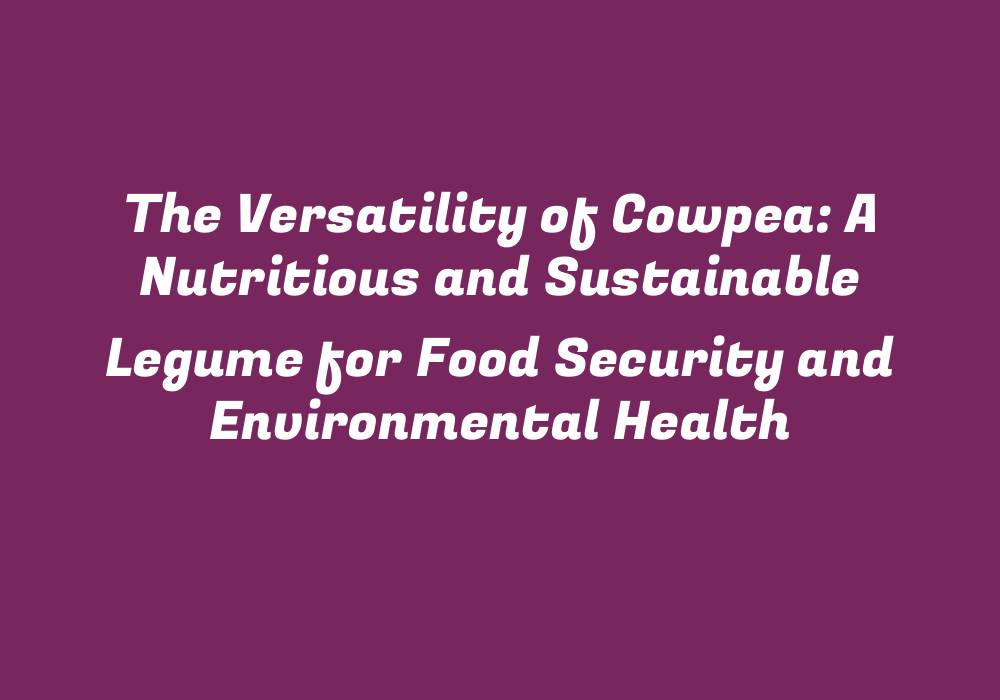Introduction to Cowpea: A Nutritious and Versatile Crop
Cowpea, also known as black-eyed peas or blackeyes, is a leguminous crop that has gained significant attention in recent years. It not only offers numerous health benefits due to its nutritional profile but is also beneficial for food security and environmental health. With its remarkable versatility, it can be used in various ways across different cultures, making it a valuable addition to any dietary plan. This article delves into the multifaceted nature of cowpea and its significance for global issues such as food security and environmental wellbeing.
Nutritional Benefits of Cowpea
Cowpea is a nutrient-dense legume, which means it contains high amounts of proteins, vitamins, minerals, and dietary fibers. Its protein content ranges from 19% to 30%, providing an excellent source for individuals who follow plant-based diets or have allergies to certain types of food. Additionally, cowpea is known for its high levels of antioxidants, particularly phenols and flavonoids that help combat the oxidative stress caused by free radicals.
The vitamin composition of cowpea includes essential nutrients such as thiamine (vitamin B1), riboflavin (vitamin B2), niacin, pyridoxine (vitamin B6), and folic acid (vitamin B9). It is also a good source of minerals, with copper, manganese, magnesium, phosphorus, potassium, iron, zinc, calcium, and sodium present in varying amounts. These nutrients play crucial roles in maintaining overall health, boosting immune function, supporting nerve transmission, and promoting muscle and bone growth.
Cowpea as a Sustainable Crop
One of the primary reasons behind the increasing popularity of cowpea is its sustainability as a food crop. Its cultivation requires less water than other crops, making it ideal for regions with limited or variable rainfall conditions. Cowpea can also be grown in marginal soils without significantly affecting the quality of the crop or compromising food security.
Another aspect of cowpea’s sustainability is its role in supporting the symbiotic relationship between legumes and bacteria called rhizobia. These bacteria fix atmospheric nitrogen, which then becomes available to the plant for growth. This process not only reduces reliance on chemical fertilizers but also enriches the soil with nutrients that can be utilized by subsequent crops.
Health Benefits of Cowpea: Food Security and Environmental Wellbeing
Cowpea’s diverse range of uses makes it a valuable commodity in addressing both food security issues and environmental health concerns. As a food staple, cowpea can be consumed as a vegetable (whole or cooked), as well as a legume in dishes like soups, stews, salads, and casseroles. This crop also serves as an important source of animal feed due to its high protein content, benefiting livestock production and maintaining a healthy ecosystem.
In terms of environmental health, cowpea plays an essential role in reducing greenhouse gas emissions. Its ability to fix atmospheric nitrogen not only improves soil fertility but also reduces the need for chemical fertilizers, which are known to contribute significantly to carbon dioxide levels in the atmosphere. Additionally, by enhancing soil fertility and crop productivity, cowpea cultivation can help minimize deforestation, as farmers may be less inclined to clear land for agricultural purposes if alternative crops like cowpea provide viable economic opportunities.
Cowpea: A Versatile Legume for a Sustainable Future
In conclusion, cowpea is an extremely versatile and nutritious crop with significant implications for food security and environmental health. Its nutritional profile offers essential proteins, vitamins, minerals, and dietary fibers, while its sustainability attributes promote resource conservation and soil fertility enhancement. By incorporating this multipurpose legume into our diets and cultivation practices, we can contribute to the global effort of addressing issues such as food insecurity and environmental degradation. With continued research and development, cowpea has the potential to become a cornerstone in creating a more sustainable and resilient future for all.
